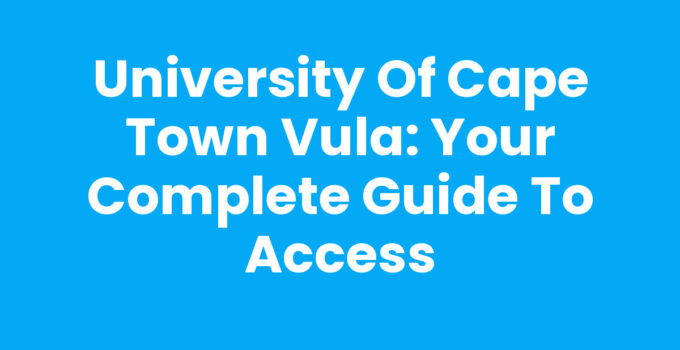Welcome to your definitive guide on the University Of Cape Town Vula platform. As a vital tool for students, Vula is an online learning environment that facilitates seamless interaction between students and educators. This guide will help you navigate Vula’s features, understand its benefits, and optimize your learning experience at the University of Cape Town.
University Of Cape Town Vula: A Step-by-Step Guide
The University Of Cape Town Vula is designed to streamline your educational journey. Here’s a detailed guide on how to log in, navigate, and make the most of this valuable resource:
Getting Started with Vula
- Accessing Vula: Visit the official University of Cape Town website. Locate the Vula link, typically found under the students’ or resources sections.
- Logging In: Enter your UCT credentials, which usually consist of your student number and password. If you encounter issues, remember to check for correct input or contact tech support.
- Dashboard Overview: Once logged in, you’ll land on the dashboard. This central hub shows your registered courses, upcoming deadlines, and notifications. Take a moment to familiarize yourself with the layout.
Exploring Course Content
- Accessing Course Materials: Click on your subject courses from the dashboard. Each course space contains essential materials like lectures, readings, assignments, and quizzes.
- Submitting Assignments: Navigate to the Assignments section within your course. Ensure you follow the submission guidelines and deadlines posted by your instructors.
- Participating in Discussions: Engage with peers through the discussion forums. This feature not only enhances learning but also allows you to share and gain insights.
Utilizing Additional Features of Vula
- Calendar Integration: Sync your Vula calendar with personal calendars to keep track of important dates and deadlines.
- Communication Tools: Leverage the platform’s messaging features to communicate directly with instructors and classmates.
- Accessing Support Services: Locate the help section for additional resources, including FAQs, tech support, and learning resources.
Check This: Discover Triumph Cape Town: Your Guide to Urban Adventure
Benefits of Using University Of Cape Town Vula
The University Of Cape Town Vula provides significant benefits overwhelmingly improving the learning experience:
- Convenience: Vula allows access to learning resources 24/7, accommodating diverse study schedules.
- Engagement: Features like forums and chat encourage collaboration and an interactive learning environment.
- Resource Accessibility: Swift access to course documents reduces the time spent searching for materials.
- Efficiency: Centralized functionalities streamline the process of learning, submitting, and communicating.
See Also: Affordable Bus Tickets From Cape Town To Mthatha: Everything You Need
Important Considerations for Vula Users
As you utilize the University Of Cape Town Vula platform, keep these considerations in mind:
- Regularly Check Updates: Instructors may post important updates, so make it a habit to log in frequently.
- Stay Organized: Use the calendar feature effectively to manage submission deadlines and exam dates.
- Participate Actively: Engaging in forums and group discussions can enhance your understanding and foster connections with peers.
In conclusion, the University Of Cape Town Vula is an essential tool for your academic success. By fully understanding its features, you can optimize your learning experience and get the most out of your education at UCT. Dive in, explore its functionalities, and connect with your fellow students and instructors.
You Might Also Like: Discover The Piercery Cape Town: Your Ultimate Guide
Frequently Asked Questions
What is University Of Cape Town Vula?
University Of Cape Town Vula is an online learning platform managing course materials, assignments, and student interactions.
How do I access University Of Cape Town Vula?
To access Vula, visit the UCT website, click on the Vula link, and log in using your UCT credentials.
What features does University Of Cape Town Vula offer?
Vula offers course materials, assignment submissions, discussion forums, calendar integration, and communication tools.



